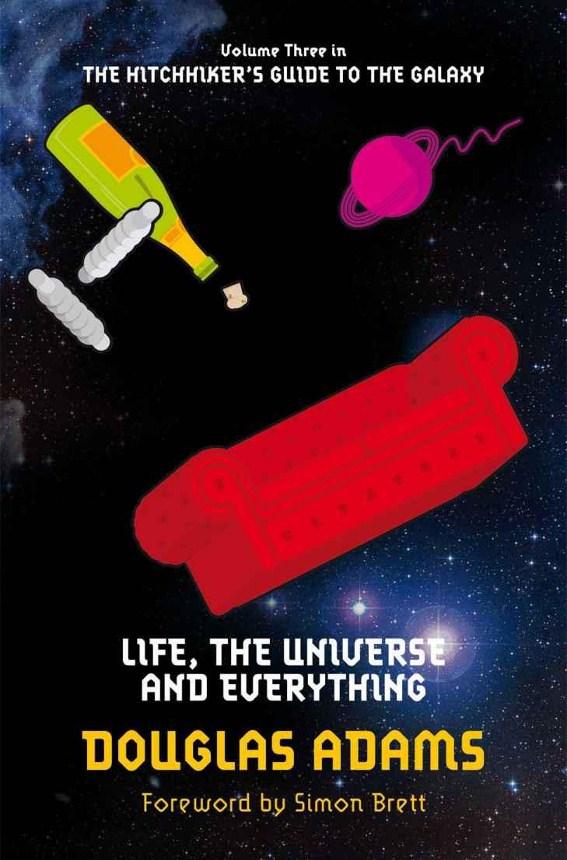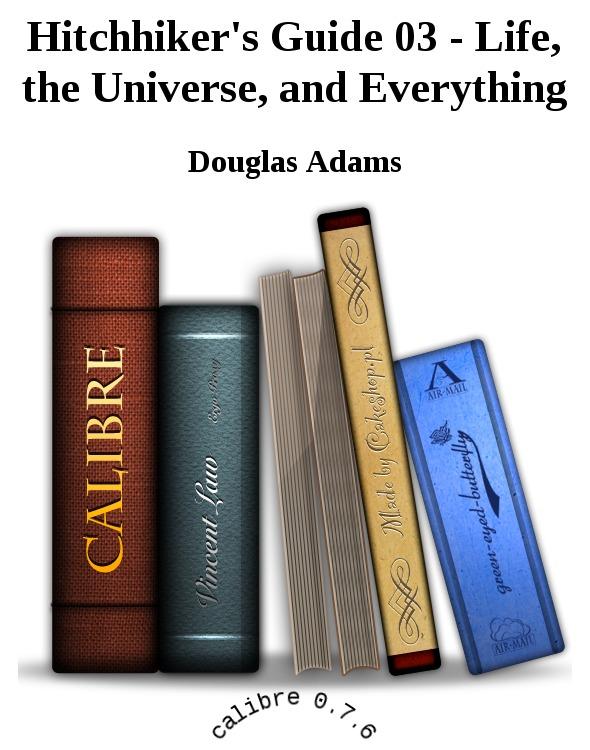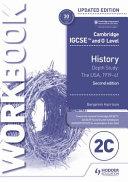Foreword
by Simon Brett
I am unique in the history of the world – and indeed of the entire universe. I am the only person who ever got a manuscript from Douglas Adams on time. The reason for this rare distinction is that I was the BBC producer who commissioned the first radio script for The Hitchhiker’s Guide to the Galaxy, and since the pilot episode could not be recorded until we had some words to record, Douglas duly delivered on time. Thereafter, of course, his propensity towards procrastination and missed deadlines became legendary.
I had first met Douglas with a bunch of other Cambridge revue writers and performers, including John Lloyd, Griff Rhys Jones and Mary Allen. He had contributed a few surreal sketches (including a classic about an unsuccessful kamikaze pilot) to a Cambridge Footlights revue to which a group of young radio Light Entertainment producers (including me) had paid a visit. I subsequently produced a radio version of that stage show.
So I saw a lot of Douglas round the BBC. I was aware of his comedy potential, but also of his huge frustration that he couldn’t find a niche for his unusual talents. Most radio comedy round that time was very stratified. Sketches were carefully structured with beginnings, middles and punchlines, and formats like that didn’t suit the sprawling, insatiable intellectual curiosity of Douglas’s mind.
I was also then producing the topical comedy programme Week Ending, and tried to get him to contribute to that. Never had there been a greater mismatch between programme and writer. A brain like Douglas’s is singularly incapable of writing wacky thirty-second quickies about Margaret Thatcher. Some of his material did appear in TheBurkissWay, another show I was producing, and that was closer
to the Adams style. But the show’s main writers, David Renwick and Andrew Marshall (both subsequently to have stellar careers in television comedy), were developing the programme in a way which left little room for outside contributions.
I still thought there was untapped potential in Douglas Adams, and so I asked him to come up with some ideas for a show of his own. On Friday 18 February 1977 we met for lunch in a Japanese restaurant, where he presented me with three ideas. I said that I thought the most promising was the science-fiction comedy which he had entitled The Hitchhiker’s Guide to the Galaxy, and that I would try to persuade my bosses in the Light Entertainment Department to commission a pilot script. The rest, as they say, is history. (And, incidentally, neither Douglas nor I could ever remember what the two ideas we rejected were.)
So, on Tuesday 28 June 1977, in the Paris Studio in Lower Regent Street, we recorded the pilot script of TheHitchhiker’s Guideto the Galaxy. It was to be the first and last episode that I produced. Not that I wouldn’t have wanted to continue, but I had recently agreed to take a new job at London Weekend Television. And the ensuing series couldn’t have been in better hands than those of the person I recommended should take over from me – Geoffrey Perkins, a brilliant comedy producer, whose death, like Douglas’s own, came far too early.
On the 12 July I played back the edited recording of the pilot to my immediate bosses. The three of them sat in stony silence for the full half-hour. At the end of the playback the Head of Light Entertainment, Con Mahoney, recognizing that what he had just heard was rather different from the department’s usual output, asked me, ‘Simon, is it funny?’ I assured him it was, and from that moment on he gave the project his full support.
Of course it was from that pilot script that TheHitchhiker’s Guide to the Galaxy developed into an international publishing sensation, the ‘trilogy of five’, of which Life, the Universe and Everything is volume three.
In this book you will find all of the trademarks of Douglas Adams’s writing, of which probably the most striking is his sheer glee in the
The regular early morning yell of horror was the sound of Arthur Dent waking up and suddenly remembering where he was.
It wasn’t just that the cave was cold, it wasn’t just that it was damp and smelly. It was that the cave was in the middle of Islington and there wasn’t a bus due for two million years.
Time is the worst place, so to speak, to get lost in, as Arthur Dent could testify, having been lost in both time and space a good deal. At least being lost in space kept you busy.
He was stranded on prehistoric Earth as the result of a complex sequence of events that had involved his being alternately blown up and insulted in more bizarre regions of the Galaxy than he had ever dreamed existed, and though life had now turned very, very, very quiet, he was still feeling jumpy.
He hadn’t been blown up now for five years.
He had hardly seen anyone since he and Ford Prefect had parted company four years previously, and he hadn’t been insulted in all that time either.
Except just once.
It had happened on a spring evening about two years ago.
He was returning to his cave just a little after dusk when he became aware of lights flashing eerily through the clouds. He turned and stared, with hope suddenly clambering through his heart. Rescue. Escape. The castaway’s impossible dream—a ship.
And as he watched, as he stared in wonder and excitement, a long silver ship descended through the warm evening air, quietly, without fuss, its long legs unlocking in a smooth ballet of technology.
It alighted gently on the ground, and what little hum it had generated died away, as if lulled by the evening calm.
A ramp extended itself.
Light streamed out.
A tall figure appeared silhouetted in the hatchway. It walked down the ramp and stood in front of Arthur.
“You’re a jerk, Dent,” it said simply.
It was alien, very alien. It had a peculiar alien tallness, a peculiar alien flattened head, peculiar slitty little alien eyes, extravagantly draped golden robes with a peculiarly alien collar design, and pale gray green alien skin that had that lustrous sheen about it that most gray green races can acquire only with plenty of exercise and very expensive soap.
Arthur boggled at it.
It gazed levelly at him.
Arthur’s first sensations of hope and trepidation had instantly been overwhelmed by astonishment, and all sorts of thoughts were battling for the use of his vocal cords at this moment.
“Whh …?” he said.
“Bu … hu … uh …” he added.
“Ru … ra … wah … who?” he managed finally to say and lapsed into a frantic kind of silence. He was feeling the effects of not having said anything to anybody for as long as he could remember.
The alien creature frowned briefly and consulted what appeared to be some species of clipboard that it was holding in its thin and spindly alien hand.
“Arthur Dent?” it said.
Arthur nodded helplessly.
“Arthur PhilipDent?” pursued the alien in a kind of efficient yap.
“Er … er … yes … er … er,” confirmed Arthur.
“You’re a jerk,” repeated the alien, “a complete kneebiter.”
come to hate them, the load of serene bastards. He had had his immortality inadvertently thrust upon him by an unfortunate accident with an irrational particle accelerator, a liquid lunch and a pair of rubber bands. The precise details of the accident are not important because no one has ever managed to duplicate the exact circumstances under which it happened, and many people have ended up looking very silly, or dead, or both, trying.
Wowbagger closed his eyes in a grim and weary expression, put some light jazz on the ship’s stereo, and reflected that he could have made it if it hadn’t been for Sunday afternoons, he really could have done.
To begin with it was fun; he had a ball, living dangerously, taking risks, cleaning up on high-yield long-term investments, and just generally outliving the hell out of everybody.
In the end, it was the Sunday afternoons he couldn’t cope with, and that terrible listlessness that starts to set in at about 2:55, when you know you’ve taken all the baths you can usefully take that day, that however hard you stare at any given paragraph in the newspaper you will never actually read it, or use the revolutionary new pruning technique it describes, and that as you stare at the clock the hands will move relentlessly on to four o’clock, and you will enter the long dark teatime of the soul.
So things began to pall for him. The merry smiles he used to wear at other people’s funerals began to fade. He began to despise the Universe in general, and everybody in it in particular.
This was the point at which he conceived his purpose, the thing that would drive him on, and which, as far as he could see, would drive him on forever. It was this.
He would insult the Universe.
That is, he would insult everybody in it. Individually, personally, one by one, and (this was the thing he really decided to grit his teeth over) in alphabetical order.
When people protested to him, as they sometimes had done, that the plan was not merely misguided but actually impossible because
of the number of people being born and dying all the time, he would merely fix them with a steely look and say, “A man can dream, can’t he?”
And so he had started out. He equipped a spaceship that was built to last with a computer capable of handling all the data processing involved in keeping track of the entire population of the known Universe and working out the horrifically complicated routes involved.
His ship fled through the inner orbits of the Sol star system, preparing to slingshot around the sun and fling itself out into interstellar space.
“Computer,” he said.
“Here,” yipped the computer.
“Where next?”
“Computing that.”
Wowbagger gazed for a moment at the fantastic jewelry of the night, the billions of tiny diamond worlds that dusted the infinite darkness with light. Every one, every single one was on his itinerary. Most of them he would be going to millions of times over.
He imagined for a moment his itinerary connecting all the dots in the sky like a child’s numbered dots puzzle. He hoped that from some vantage point in the Universe it might be seen to spell a very, very rude word.
The computer beeped tunelessly to indicate that it had finished its calculations.
“Folfanga,” it said. It beeped.
“Fourth world of the Folfanga system,” it continued. It beeped again.
“Estimated journey time, three weeks,” it continued further. It beeped again.
Arthur’s eyes did cartwheels.
“You see …” said Ford.
“Where have you been?” interrupted Arthur, now that his head had finished working out.
“Around,” said Ford, “around and about.” He grinned in what he accurately judged to be an infuriating manner. “I just took my mind off the hook for a bit. I reckoned that if the world wanted me badly enough it would call back. It did.”
He took out of his now terribly battered and dilapidated satchel his Sub-Etha Sens-O-Matic.
“At least,” he said, “I think it did. This has been playing up a bit.” He shook it. “If it was a false alarm I shall go mad,” he said, “again.”
Arthur shook his head and sat down. He looked up.
“I thought you must be dead …” he said simply.
“So did I for a while,” said Ford, “and then I decided I was a lemon for a couple of weeks. I kept myself amused all that time jumping in and out of a gin and tonic.”
Arthur cleared his throat, and then did it again. “Where,” he said, “did you …?”
“Find a gin and tonic?” said Ford brightly. “I found a small lake that thought it was a gin and tonic, and jumped in and out of that. At least, I think it thought it was a gin and tonic.
“I may,” he added with a grin that would have sent sane men scampering into trees, “have been imagining it.”
He waited for a reaction from Arthur, but Arthur knew better than that.
“Carry on,” he said evenly.
“The point is, you see,” said Ford, “that there is no point in driving yourself mad trying to stop yourself going mad. You might just as well give in and save your sanity for later.”
“And this is you sane again, is it?” asked Arthur. “I ask merely for information.”
“I went to Africa,” said Ford.
“Yes?”
“Yes.”
“What was that like?”
“And this is your cave, is it?” said Ford.
“Er, yes,” said Arthur. He felt very strange. After nearly four years of total isolation he was so pleased and relieved to see Ford that he could almost cry. Ford was, on the other hand, an almost immediately annoying person.
“Very nice,” said Ford, in reference to Arthur’s cave. “You must hate it.”
Arthur didn’t bother to reply.
“Africa was very interesting,” said Ford. “I behaved very oddly there.”
He gazed thoughtfully into the distance.
“I took up being cruel to animals,” he said airily. “But only,” he added, “as a hobby.”
“Oh, yes,” said Arthur, warily.
“Yes,” Ford assured him. “I won’t disturb you with the details because they would …”
“What?”
“Disturb you. But you may be interested to know that I am singlehandedly responsible for the evolved shape of the animal you came to know in later centuries as a giraffe. And I tried to learn to fly. Do you believe me?”
“Tell me,” said Arthur.
“I’ll tell you later. I’ll just mention that the Guidesays …”
“The …?”
“Guide.TheHitchhiker’sGuidetotheGalaxy. You remember?”
“Yes. I remember throwing it in the river.”
“Yes,” said Ford, “but I fished it out.”
“You didn’t tell me.”
“I didn’t want you to throw it in again.”
“Fair enough,” admitted Arthur. “It says?”
“What?”
“The Guidesays?”
“The Guidesays that there is an art to flying,” said Ford, “or rather a knack. The knack lies in learning how to throw yourself at the ground and miss.” He smiled weakly. He pointed at the knees of his trousers and held his arms up to show the elbows. They were all torn and worn through.
“I haven’t done very well so far,” he said. He stuck out his hand. “I’m very glad to see you again, Arthur,” he added.
Arthur shook his head in a sudden access of emotion and bewilderment.
“I haven’t seen anyone for years,” he said, “not anyone. I can hardly even remember how to speak. I keep forgetting words. I practice, you see. I practice by talking to … talking to … what are those things people think you’re mad if you talk to? Like George the Third.”
“Kings?” suggested Ford.
“No, no,” said Arthur, “the things he used to talk to. We’re surrounded by them, for heaven’s sake. I’ve planted hundreds myself. They all died. Trees! I practice by talking to trees. What’s that for?”
Ford still had his hand stuck out. Arthur looked at it with incomprehension.
“Shake,” prompted Ford.
Arthur did, nervously at first, as if it might turn out to be a fish. Then he grasped it vigorously with both hands in an overwhelming flood of relief. He shook it and shook it.
After a while Ford found it necessary to disengage. They climbed to the top of a nearby outcrop of rock and surveyed the scene
around them.
“What happened to the Golgafrinchans?” asked Ford.
Arthur shrugged.
“A lot of them didn’t make it through the winter three years ago,” he said, “and the few who remained in the spring said they needed a holiday and set off on a raft. History says that they must have survived.…”
“Huh,” said Ford, “well well.” He stuck his hands on his hips and looked around again at the empty world. Suddenly, there was about Ford a sense of energy and purpose.
“We’re going,” he said excitedly, and shivered with energy.
“Where? How?” said Arthur.
“I don’t know,” said Ford, “but I just feel that the time is right. Things are going to happen. We’re on our way.”
He lowered his voice to a whisper.
“I have detected,” he said, “disturbances in the wash.”
He gazed keenly into the distance and looked as if he would quite like the wind to blow his hair back dramatically at that point, but the wind was busy fooling around with some leaves a little way off.
Arthur asked him to repeat what he had just said because he hadn’t quite understood his meaning. Ford repeated it.
“The wash?” said Arthur.
“The space-time wash,” said Ford and, as the wind blew briefly past at that moment, he bared his teeth into it.
Arthur nodded, and then cleared his throat.
“Are we talking about,” he asked cautiously, “some sort of Vogon laundromat, or what are we talking about?”
“Eddies,” said Ford, “in the space-time continuum.”
“Ah,” nodded Arthur, “is he. Is he.” He pushed his hands into the pockets of his dressing gown and looked knowledgeably into the distance.
“What?” said Ford.
“Er, who,” said Arthur, “is Eddy, then, exactly, then?” Ford looked angrily at him. “Will you listen?” he snapped.
“I have been listening,” said Arthur, “but I’m not sure it’s helped.”
Ford grasped him by the lapels of his dressing gown and spoke to him as slowly and distinctly and patiently as if he were somebody from the telephone company accounts department.
“There seem …” he said, “to be some pools …” he said, “of instability … he said, “in the fabric …” he said.
Arthur looked foolishly at the cloth of his dressing gown where Ford was holding it. Ford swept on before Arthur could turn the foolish look into a foolish remark.
“ … in the fabric of space-time,” he said.
“Ah, that,” said Arthur.
“Yes, that,” confirmed Ford.
They stood there alone on a hill on prehistoric Earth and stared each other resolutely in the face.
“And it’s done what?” said Arthur.
“It,” said Ford, “has developed pools of instability.”
“Has it,” said Arthur, his eyes not wavering for a moment.
“It has,” said Ford, with a similar degree of ocular immobility.
“Good,” said Arthur.
“See?” said Ford.
“No,” said Arthur.
There was a quiet pause.
“The difficulty with this conversation,” said Arthur after a sort of ponderous look had crawled slowly across his face like a mountaineer negotiating a tricky outcrop, “is that it’s very different from most of the ones I’ve had of late. Which, as I explained, have mostly been with trees. They weren’t like this. Except perhaps some
of the ones I’ve had with elms that sometimes got a bit bogged down.”
“Arthur,” said Ford.
“Hello? Yes?” said Arthur.
“Just believe everything I tell you, and it will all be very, very simple.”
“Ah, well, I’m not sure I believe that.”
They sat down and composed their thoughts.
Ford got out his Sub-Etha Sens-O-Matic. It was making vague humming noises and a tiny light on it was flickering faintly.
“Flat battery?” said Arthur.
“No,” said Ford, “there is a moving disturbance in the fabric of space-time, an eddy, a pool of instability, and it’s somewhere in our vicinity.”
“Where?”
Ford moved the device in a slow, lightly bobbing semicircle. Suddenly the light flashed.
“There!” said Ford, shooting out his arm; “there, behind that sofa!”
Arthur looked. Much to his surprise, there was a velvet paisleycovered Chesterfield sofa in the field in front of them. He boggled intelligently at it. Shrewd questions sprang into his mind.
“Why,” he said, “is there a sofa in that field?”
“I told you!” shouted Ford, leaping to his feet. “Eddies in the space-time continuum!”
“And this is his sofa, is it?” asked Arthur, struggling to his feet and, he hoped, though not very optimistically, to his senses.
“Arthur!” shouted Ford at him, “that sofa is there because of the space-time instability I’ve been trying to get your terminally softened brain to come to grips with. It’s been washed up out of the continuum, it’s space-time jetsam, it doesn’t matter what it is, we’ve got to catch it, it’s our only way out of here!”
They remained crouched there for a few moments, frowning deeply. The blue thing shaped like a policeman tapped them both on the shoulders.
“Come on, you two,” the shape said, “let’s go.”
These words had an electrifying effect on Arthur. He leaped to his feet and shot a series of startled glances at the panorama around him that had suddenly settled down into something of quite terrifying ordinariness.
“Where did you get this from?” he yelled at the policeman shape.
“What did you say?” said the startled shape.
“This is Lord’s Cricket Ground, isn’t it?” snapped Arthur. “Where did you find it, how did you get it here? I think,” he added, clasping his hand to his brow, “that I had better calm down.” He squatted down abruptly in front of Ford.
“It is a policeman,” he said. “What do we do?”
Ford shrugged. “What do you want to do?” he said.
“I want you,” said Arthur, “to tell me that I have been dreaming for the last five years.”
Ford shrugged again, and obliged.
“You’ve been dreaming for the last five years,” he said.
Arthur got to his feet.
“It’s all right, officer,” he said, “I’ve been dreaming for the last five years. Ask him,” he added, pointing at Ford, “he was in it.” Having said this, he sauntered off toward the edge of the pitch, brushing down his dressing gown. He then noticed his dressing gown and stopped. He stared at it. He turned around. He flung himself at the policeman.
“So where did I get these clothes from?” he howled.
He collapsed and lay twitching on the grass.
Ford shook his head.
“He’s had a bad two million years,” he said to the policeman, and together they heaved Arthur onto the sofa and carried him off the
pitch and were only briefly hampered by the sudden disappearance of the sofa on the way.
Reactions to all this from the crowd were many and various. Most of them couldn’t cope with watching it, and listened to it on the radio instead.
“Well, this is an interesting incident, Brian,” said one radio commentator to another. “I don’t think there have been any mysterious materializations on the pitch since, oh, since, well, I don’t think there have been any, have there? That I recall?”
“Edgbaston 1932?”
“Ah, now what happened then …?”
“Well, Peter, I think it was Canter facing Willcox coming up to bowl from the pavilion end when a spectator suddenly ran straight across the pitch.’
There was a pause while the first commentator considered this.
“Ye … e … s …” he said, “yes, there’s nothing actually very mysterious about that, is there? He didn’t actually materialize, did he? Just ran on.”
“No, that’s true, but he did claim to have seen something materialize on the pitch.”
“Ah, did he.”
“Yes. An alligator, I think, of some description.”
“And what happened to the man?”
“Well, I think someone offered to take him off and give him some lunch, but he explained that he’d already had a rather good one, so the matter was dropped and Warwickshire went on to win by three wickets.”
“So, not very like this current instance. For those of you who’ve just tuned in, you may be interested to know that, er … two men, two rather scruffily attired men, and indeed a sofa—a Chesterfield I think?”
“Yes, a Chesterfield.”
“Have just materialized here in the middle of Lord’s Cricket Ground. But I don’t think they meant any harm, they’ve been very good-natured about it, and …”
“Sorry, can I interrupt you a moment, Peter, and say that the sofa has just vanished.”
“So it has. Well, that’s one mystery less. Still, it’s definitely one for the record books I think, particularly occurring at this dramatic moment in play, England now needing only twenty-four runs to win the series. The men are leaving the pitch in the company of a police officer, and I think everyone’s settling down now and play is about to resume.”
“Now, sir,” said the policeman after they had made a passage through the curious crowd and laid Arthur’s peacefully inert body on a blanket, “perhaps you’d care to tell me who you are, where you come from and what that little scene was all about?”
Ford looked at the ground for a moment as if steadying himself for something, then he straightened up and aimed a look at the policeman that hit him with the full force of every inch of the six light-years’ distance between Earth and Ford’s home near Betelgeuse.
“All right,” said Ford, very quietly, “I’ll tell you.”
“Yes, well, that won’t be necessary,” said the policeman hurriedly, “just don’t let whatever it was happen again.” The policeman turned around and wandered off in search of anyone who wasn’t from Betelgeuse. Fortunately, the cricket ground was full of them.
Arthur’s consciousness approached his body as from a great distance, and reluctantly. It had had some bad times in there. Slowly, nervously, it entered and settled down into its accustomed position.
Arthur sat up.
“Where am I?” he said.
“Lord’s Cricket Ground,” said Ford.
the trajectory of the ball and jogged momentarily. He stiffened. He looked along the flight path of the ball again and his eyes twitched again.
“This isn’t my towel,” said Arthur, who was rummaging in his rabbit-skin bag.
“Shhh,” said Ford. He screwed his eyes up in concentration.
“I had a Golgafrinchan jogging towel,” continued Arthur; “it was blue with yellow stars on it. This isn’t it.”
“Shhh,” said Ford again. He covered one eye and looked with the other.
“This one’s pink,” said Arthur. “It isn’t yours, is it?”
“I would like you to shut up about your towel,” said Ford.
“It isn’t my towel,” insisted Arthur, “that is the point I am trying to
“And the time at which I would like you to shut up about it,” continued Ford in a low growl, “is now.”
“All right,” said Arthur, starting to stuff it back into the primitively stitched rabbit-skin bag. “I realize that it is probably not important in the cosmic scale of things, it’s just odd, that’s all. A pink towel suddenly, instead of a blue one with yellow stars.”
Ford was beginning to behave rather strangely, or rather not actually beginning to behave strangely but beginning to behave in a way that was strangely different from the other strange ways in which he more regularly behaved. What he was doing was this. Regardless of the bemused stares it was provoking from his fellow members of the crowd gathered round the pitch, he was waving his hands in sharp movements across his face, ducking down behind some people, leaping up behind others, then standing still and blinking a lot. After a moment or two of this he started to stalk forward slowly and stealthily, wearing a puzzled frown of concentration, like a leopard that is not sure whether it’s just seen a half-empty tin of cat food half a mile away across a hot and dusty plain.
“This isn’t my bag either,” said Arthur suddenly.
Ford’s spell of concentration was broken. He turned angrily on Arthur.
“I wasn’t talking about my towel,” said Arthur. “We’ve established that it isn’t mine. It’s just that the bag into which I was putting the towel that is not mine is also not mine, though it is extraordinarily similar. Now personally, I think that that is extremely odd, especially as the bag was one I made myself on prehistoric Earth. These are also not my stones,” he added, pulling a few flat gray stones out of the bag. “I was making a collection of interesting stones and these are clearly very dull ones.”
A roar of excitement thrilled through the crowd and obliterated whatever it was that Ford said in reply to this piece of information. The cricket ball that had excited this reaction fell out of the sky and dropped neatly into Arthur’s mysterious rabbit-skin bag.
“Now I would say that that was also a very curious event,” said Arthur, rapidly closing the bag and pretending to look for the ball on the ground.
“I don’t think it’s here,” he said to the small boys who immediately clustered around him to join in the search; “it probably rolled off somewhere. Over there I expect.” He pointed vaguely in the direction in which he wished they would push off. One of the boys looked at him quizzically.
“You all right?” said the boy.
“No,” said Arthur.
“That why you got a bone in your beard?” said the boy.
“I’m training it to like being wherever it’s put.” Arthur prided himself on saying this. It was, he thought, exactly the sort of thing that would entertain and stimulate young minds.
“Oh,” said the small boy, putting his head on one side and thinking about it. “What’s your name?”
“Dent,” said Arthur, “Arthur Dent.”













